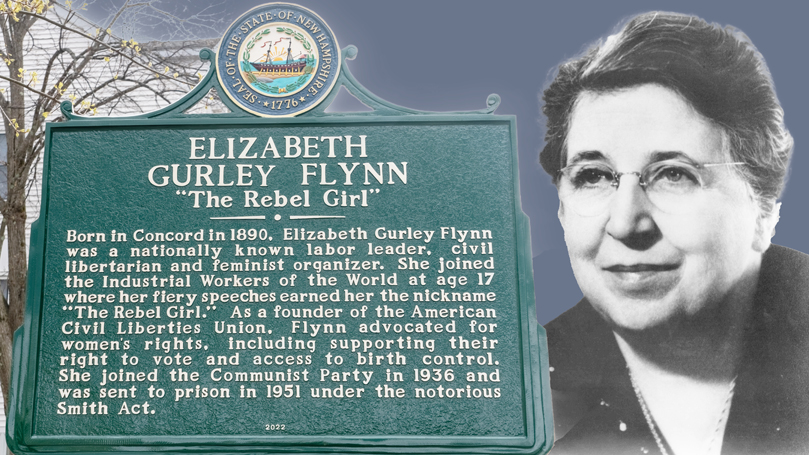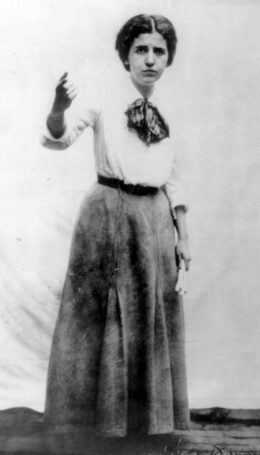
In early May, the historical marker for Elizabeth Gurley Flynn at her birthplace in Concord, New Hampshire was taken down by Republican members of the city’s executive council. So much for GOP objections to “cancel culture!”
Why is a woman whose life was dedicated to justice, human rights and free speech so threatening? The state’s governor, Chris Sununu, has no problem with that. But we should all have a problem with it since Elizabeth Gurley Flynn, known as “the Rebel Girl” can help us answer basic questions about our world today. Why can women vote? Why are unions multi-racial and multi-national? Why are we still fighting for women’s right to decide when to bear children? How do we defend people’s rights to speak their minds against powerful, moneyed forces? Why are we losing the right for children to educate themselves rather than work night shifts in the dirtiest jobs of the meat industry?
If Elizabeth Gurley Flynn’s life is important enough to hide, then her life is important enough to know. Born in 1890 to Irish immigrant parents, Elizabeth Gurley Flynn was an agitator who crossed the country to speak for the most marginalized people in the US since she was fifteen years old. She was a founder of the American Civil Liberties Union for the rights of free speech. She was a member of the Industrial Workers of the World that sought to organize unions for all workers of all races, all occupations, all genders and all nationalities. She joined the Communist Party of the United States during the Great Depression in 1937 and continued to champion socialism as an answer to capitalism’s greed and dispossession until she died in 1964.
 Elizabeth Gurley Flynn was just one person of millions in the United States who have fought for the basic necessities of wellbeing: dignity, respect, autonomy, collectivity, equality alongside food, shelter and living wages. She was a vocal champion for all of these basic necessities. When we learn about Flynn’s life, we learn about the 1912 Lawrence Massachusetts textile mill strike of young female immigrant workers and their ripple effects in an industry barely organized. Young women workers created International Women’s Day celebrated on March 8th around the world. When we learn about Flynn’s life, we discover the origins of the first sit-down strike at the General Electric plant in Schenectady, New York in 1906. We learn about the mining workers’ struggles that spanned the country from Tacoma, Washington, to Missoula, Montana and Duluth, Minnesota.
Elizabeth Gurley Flynn was just one person of millions in the United States who have fought for the basic necessities of wellbeing: dignity, respect, autonomy, collectivity, equality alongside food, shelter and living wages. She was a vocal champion for all of these basic necessities. When we learn about Flynn’s life, we learn about the 1912 Lawrence Massachusetts textile mill strike of young female immigrant workers and their ripple effects in an industry barely organized. Young women workers created International Women’s Day celebrated on March 8th around the world. When we learn about Flynn’s life, we discover the origins of the first sit-down strike at the General Electric plant in Schenectady, New York in 1906. We learn about the mining workers’ struggles that spanned the country from Tacoma, Washington, to Missoula, Montana and Duluth, Minnesota.
We must remember when she was arrested in 1951 under the notorious Smith Act – an Act that criminalized words. To speak for worker’s rights became a crime. To agitate for an end to Jim Crow segregation of Black people’s lives from housing, jobs and basic dignity became a crime. To share the values of equality for all people was not only suspect under the Smith Act, it demanded imprisonment, and Elizabeth Gurley Flynn served time for speaking up and speaking out. Gurley Flynn’s speech at her Smith Act trial is considered one of the 100 best speeches of the 20th century.
But let’s not stop with a marker for Elizabeth Gurley Flynn’s life in Concord, New Hampshire. We need markers for the millions of people in the United States who fought for our basic right to live and to thrive. To erase the life of Elizabeth Gurley Flynn clouds our memories of our long, proud histories of struggle and the benefits those struggles have won. To forget Flynn makes vulnerable the very rights we depend upon to strengthen, expand and recover our shared wellbeing today.
In 1940 Gurley-Flynn was removed from the Board of the ACLU for her beliefs. The ACLU posthumously reinstated her after the labor leader’s death. Can the good people of New Hampshire do less?
Image: Elizabeth Gurley Flynn, “The Rebel Girl” historical marker by Marc Nozell (CC BY 2.0) / Elizabeth Gurley Flynn, CPUSA; Elizabeth Gurley Flynn (public domain)


 Join Now
Join Now